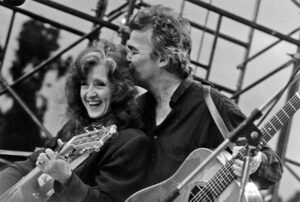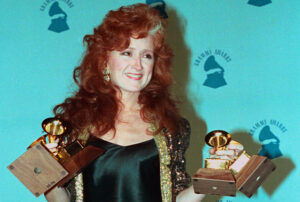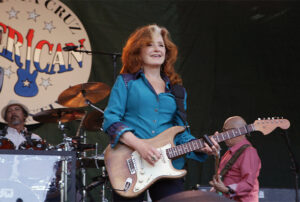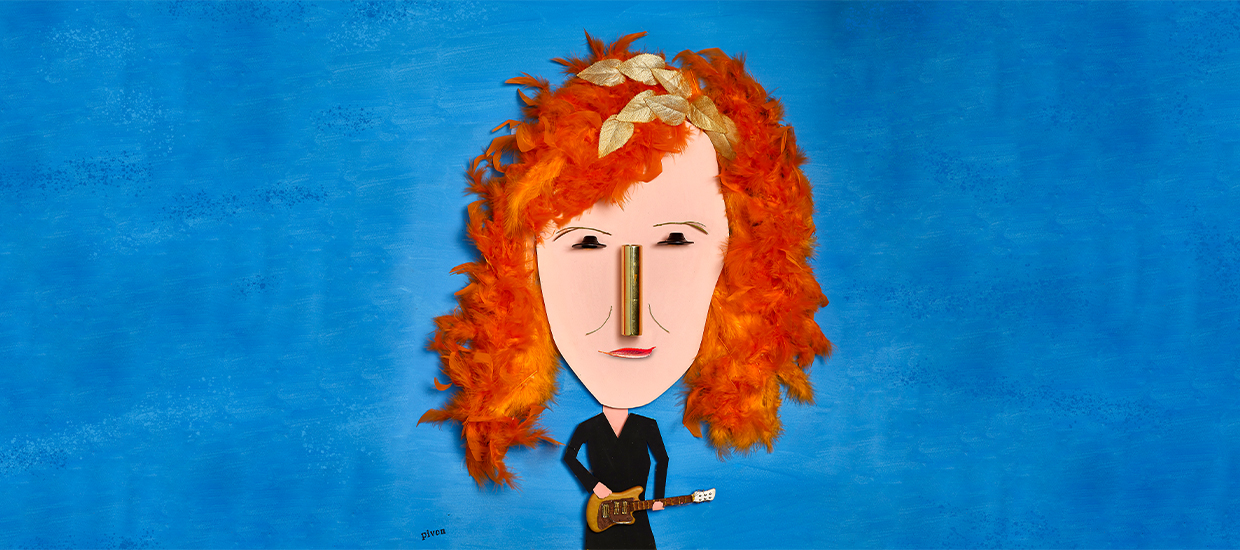The rock ’n’ roll legend is back with her 21st album
Having a conversation with Bonnie Raitt is less like talking to a rock star than it is like chatting with a friendly musicologist. Her sentences are peppered with the names of her forebears (Muddy Waters, Memphis Minnie), her contemporaries (James Taylor, Jackson Browne), and the next generation (Sara Watkins, Brandi Carlile), but it never feels as if she’s dropping names; she just genuinely loves music and the people who play it.
Of course, Raitt is a rock star of the highest order, and has been since she released the first of her 21 albums in 1971 at the age of 22. Now 72, she has recorded iconic hits (who hasn’t listened to “I Can’t Make You Love Me” after a breakup?), established herself as rock’s preeminent guitar goddess, raised awareness for countless political causes, and spent virtually the entire last half a century on tour.
The nonstop touring came to an abrupt halt two years ago, with the onset of COVID-19, a disease that claimed friends of Raitt’s including reggae legend Toots Hibbert and songwriter par excellence John Prine. This spring, though, she’s rising from the pandemic ashes— what could be more phoenix-like than her famously fiery hair?—with a new album, Just Like That, and a tour that sees her hit the road with support from Lucinda Williams and Mavis Staples. Raitt called Hemispheres from her home in Northern California on a sunny winter afternoon to talk about the record, her rock ’n’ roll legacy, and her hopes for “brighter days” ahead.

The pandemic has been tough on everyone, but I can’t imagine what it’s like for a touring musician. Have you played any shows since 2020?
No, my last live gig was at Madison Square Garden, opening for Mark Knopfler, in September of 2019. Then I was ready to go on tour with James Taylor, and that got canceled. I’ve done about 15 recordings from my house for election support and a lot of community relief efforts. I did all these songs alone from my house, and a couple were duets with Boz Scaggs that we did remotely—we actually socially distanced in a big theater that nobody was in and cut a couple of songs for some candidates close to the election. So I stayed completely busy, supporting causes and recording songs, but I had not had a chance to play with my band until we recorded, so you can imagine how much fun it was to get back together.
It must have been cathartic.
Oh absolutely. Not only did we miss each other, but we missed playing live. And I still haven’t played for an audience that was clapping back to me. I mean, I’ve been on the road since I was 20. In 52 years, I’ve never gone this long without playing for people.
Aside from not being able to play, you lost a few close friends to COVID, among them John Prine, the writer of one of your signature songs, “Angel from Montgomery,” who died in April of 2020. How hard was that?
It was just devastating. One of the hardest interviews I’ve ever had to do was to be on CNN live with Anderson Cooper within 24 hours of when I got the news that John had passed. He was a very close friend, and a big inspiration. On this record, I wrote two songs that are really inspired in many ways by John and Jackson Browne and the early Dylan records—by the story songs of those guys. It’s just something that was really beautiful to do in tribute to John.
The narrator of one of those songs, “Down the Hall,” is an inmate who’s working in a prison hospice unit. How did that one come to you?
In 2018, I saw an article in The New York Times Magazine about these prison hospice programs. About 75 different communities around the country have these programs, but I had never heard anything about them. I read the article and put it down and was just weeping. It stayed with me for weeks afterward, and I knew that I wanted to write a song. I put myself in the place of what it would be like for one of those guys to be in prison for who knows how long, and what kind of life he or she led leading up to that, and then I just made it kind of a short story, in the way of “The Lonesome Death of Hattie Carroll” by Bob Dylan, but especially “Donald and Lydia” and “Christmas in Prison” and “Angel from Montgomery” from John Prine.

On Just Like That, you have ballads, you have blues-rock stompers, you even throw some funk in. When you’re recording, do you think about the composition of the album as a whole?
I put together an album the way I do a show, in that I kind of want to balance blues and up-tempo, heartbreak songs and folk songs, and have a couple of oddities in there. I like to mix it up a little bit, texturally. I plan it almost like you would a meal. I know people listen differently now with streaming—they may only pick one or two songs and only listen to the ones that seem to have the most plays—but I still compose a record, and a lot of times I do it because vinyl is still so important. I’m cognizant of putting a Side 1 and a Side 2.
You’re receiving a Lifetime Achievement Grammy Award this month. Was there a moment when you realized you were on rock ’n’ roll’s Mount Rushmore?
[Laughs.] I don’t really think about it like that. When the Americana Music Association started putting on annual awards events, I met all these younger artists that just knocked me out, like Sara Watkins and Shovels & Rope. Every time I’ve been involved with Americana Association benefits and awards, I’ve been told by younger artists how much I meant to them. So, I don’t know, maybe eight or nine years ago I realized I’ve reached this cultural status where I’m like a mentor to a lot of these artists. Brandi Carlile, years ago, wrote me a personal note and told me how much I meant to her and sent me her album, and she and I have become good friends and collaborated together. It’s been really great. I looked up to Sippie Wallace and Muddy Waters and John Lee Hooker, and here I am, turned into one of those people that people look up to. And that gives me another reason to keep going.
One thing that I think has made you important is that you’re a woman who is respected not only as a singer but as a guitar player. I hang out with some old hippie dude musicians, and when I mentioned I was going to talk to you…
I wonder what they said—like, “What a fox!” [Laughs.]
Even better: They talked about how you have chops.
That’s so great, and yeah, I think the number of really badass women musicians—I see them anytime I watch Beyoncé’s band, Prince’s band, the late-night bands on TV—there’s just more and more women getting play on all kinds of instruments, and it makes me really happy. And I’ll be happy when there are more women producers and engineers and executives in the record companies too.

In the liner notes of the new record, you say, “Let’s hope some brighter days are coming.” Do you believe they are?
[Laughs.] I’d like to see this in print: “She laughs.” “Chortles.” … I won’t kid you that this time is the most fraught and worrisome in my lifetime. The polarization and the increased vitriol and the delusional misinformation and the lack of a responsible center, in journalism and in the culture and in politics, is a source of great stress and pain for me personally. Having said that, I also am not without hope. I just think we have to really not put our heads in the sand and throw our hands up in the air—which is a great image, to do both those things at the same time [laughs]—but I feel like we’re just gonna have to redouble our efforts to get people to the polls. So I am, I can say, hopeful, but that’s only if we work at it, if we really pay attention and do what we can. And the meta message is that we really gotta stop turning each other into the other side. I want to try to encourage whatever activities we can do and whatever coming together we can have that allows us to see the humanity in each other.
Speaking of seeing the humanity in each other, the other song I found particularly moving on Just Like That is the title track, about a heart-transplant recipient meeting the donor’s mother. Talk about something bringing people together.
I was not expecting to write a song about it, but I [was watching] the evening news, and they showed a woman that knocked on a door, and this guy opened it and invited this woman in and the TV crew came in, and he said, “Would you like to put your head on my chest?” And I just—I’m losing it again. The two times when I’ve broken down and wept, I ended up writing story songs for this record. I don’t know how I’m going to perform them!

Stories like that do give you a little bit of hope for brighter days, though.
Absolutely. When you see evidence of people in disasters putting themselves out to invite a family to live in their basement, or in the case of the Charleston church forgiving the murderer within days of when their parishioners were all murdered, those stories of love in the face of so much cruelty and pain and fear, that’s why I’m crying still: Because we need these stories. I think most of us are really wonderfully loving human beings that want to do the right thing and don’t want to see someone else suffer. We just gotta find the love in the other person and not demonize each other. I know that sounds like a sing-song, facile solution, but really, we just gotta take what makes us cry and get together about it.
I want to thank you for taking the time to talk to me today. You probably have lots of other calls you have to do…
I get to talk about blues! I get to be DJ on SiriusXM’s blues show. I get to pick my favorite women blues singers and talk about why they’re so great.
Who’s on the playlist?
Oh god, a whole slew: Memphis Minnie, Dinah Washington, Etta James, Ma Rainey, Sippie Wallace, and a bunch of younger women, like Larkin Poe and Susan Tedeschi. What a singer! She just slays me.
Next Up: Loretta Lynn on her Timeless Friendship with Patsy Cline
